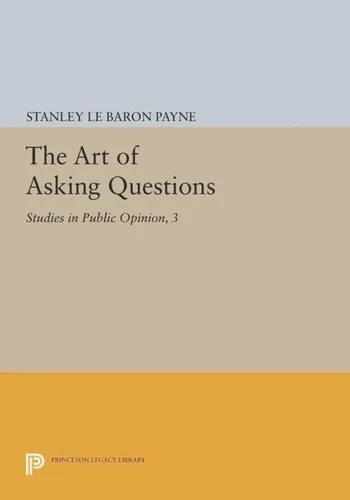The Art of Asking Questions: Studies in Public Opinion, 3
4.7
Reviews from our users

You Can Ask your questions from this book's AI after Login
Each download or ask from book AI costs 2 points. To earn more free points, please visit the Points Guide Page and complete some valuable actions.Introduction to "The Art of Asking Questions: Studies in Public Opinion, 3"
Effective communication is a cornerstone of understanding human behavior, public opinion, and societal dynamics. "The Art of Asking Questions: Studies in Public Opinion, 3," written by Stanley Le Baron Payne, delves into this very subject with unparalleled depth. This seminal work serves as both an intellectual exploration and a practical guide to the science and art of questioning within the realms of public opinion research.
In this book, the intricacies of crafting questions and the profound impact they wield on responses are meticulously unpacked. From survey methods to interview techniques, it addresses the psychological and sociological dimensions of questioning. By navigating through the elements that make an inquiry precise, unbiased, and reliable, Payne equips readers with a toolkit to enhance the accuracy of data collection and interpretation. The enduring relevance of this book lies in its precise treatment of a skill as timeless as communication itself: the ability to ask the right questions.
Detailed Summary of the Book
"The Art of Asking Questions" takes readers on a methodical journey through the nuances of crafting effective and unbiased questions in the context of public opinion research.
The book begins by addressing the fundamental question: why do questions matter at all? Payne makes the case that the way a question is framed often has an outsized influence on the answers it elicits. What follows is a rigorous investigation of question design, including the dangers of ambiguity, double-barreled wording, or leading phrasing, which can skew results and introduce bias into survey or interview responses.
A major portion of the book is devoted to discussing the psychological responses to questions and identifying the cognitive loads that various forms of phrasing impose on respondents. Payne emphasizes the importance of simplicity without sacrificing the intent of the inquiry. Special attention is given to the delicate balance between open-ended and closed-ended questions, analyzing how each serves different research objectives.
The latter chapters explore the broader implications of questioning, particularly in public opinion polling, political research, social science, and market analysis. Payne ties his arguments to real-world examples, illustrating the importance of ethical considerations and cultural sensitivity to ensure responses are reflective of genuine opinions rather than induced reactions.
Key Takeaways
- The structure and wording of a question significantly influence the responses obtained.
- Psychological and cultural factors must be accounted for when designing surveys or interviews.
- Ambiguities or biases in question phrasing can severely undermine the reliability of research data.
- Closed questions yield structured data, while open-ended questions offer richer qualitative insights.
- An effective questionnaire is based on a clear understanding of the demographic and cultural background of the respondents.
Famous Quotes from the Book
"A question is not merely a sentence ending with a question mark but a tool for uncovering truths, perspectives, and understandings."
"The clarity of a question ensures the clarity of an answer; a cloudy question ensures nothing but uncertainty."
"Survey research begins and ends with the integrity of the questions asked and the responses gathered."
Why This Book Matters
The perennial relevance of "The Art of Asking Questions" lies in its foundational exploration of communication, psychology, and sociology. At its heart, this book stresses that the act of questioning is not a mundane task but a powerful technique capable of revealing profound truths about human thought and opinion. Whether you're a researcher, journalist, marketer, or policymaker, this book enhances your ability to gather valid and actionable insights.
In our data-driven world, where public opinion plays a critical role in shaping decisions across industries, Payne’s timeless principles serve as a guidepost. His attention to the ethical implications of creating impartial and reliable surveys underscores the mission of fostering accuracy and trust in communication.
For anyone interested in improving their ability to extract meaningful information—whether in professional contexts or interpersonal relationships—this book offers a comprehensive foundation in the art of asking questions effectively.
Free Direct Download
You Can Download this book after Login
Accessing books through legal platforms and public libraries not only supports the rights of authors and publishers but also contributes to the sustainability of reading culture. Before downloading, please take a moment to consider these options.
Find this book on other platforms:
WorldCat helps you find books in libraries worldwide.
See ratings, reviews, and discussions on Goodreads.
Find and buy rare or used books on AbeBooks.
1229
بازدید4.7
امتیاز50
نظر98%
رضایتReviews:
4.7
Based on 0 users review
"کیفیت چاپ عالی بود، خیلی راضیام"


